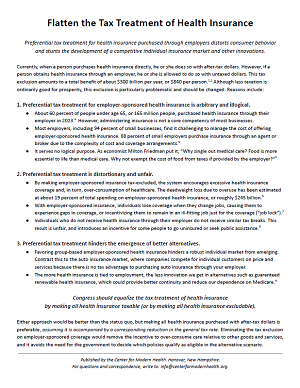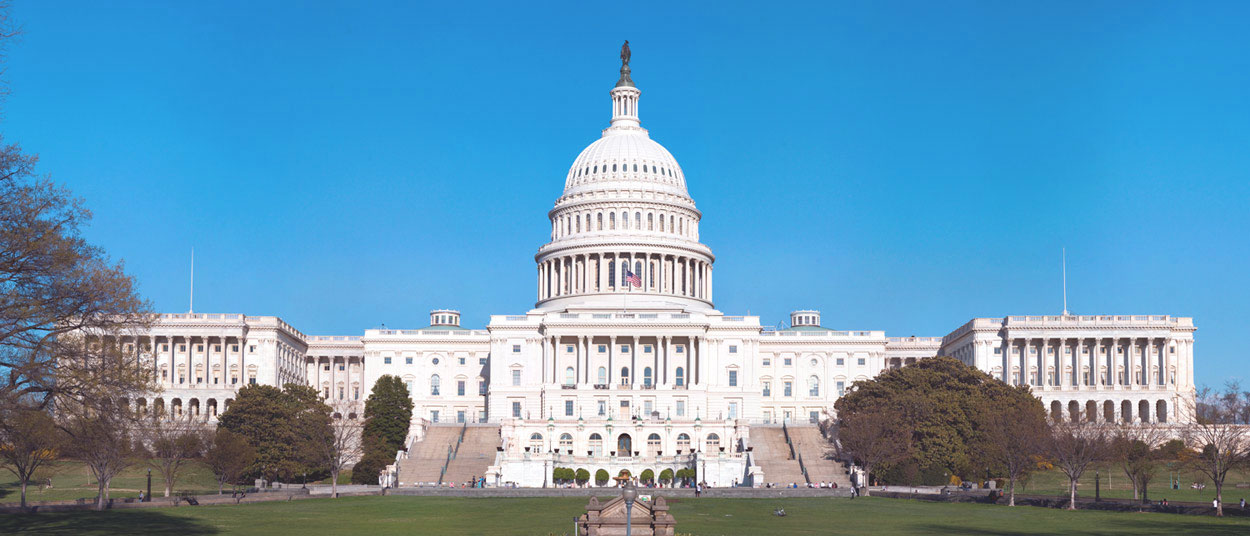Flatten the Tax Treatment of Health Insurance
Preferential tax treatment for health insurance purchased through employers distorts consumer behavior and stunts the development of a competitive individual insurance market and other innovations.
View/Download [PDF]
Center for Modern Health. "Flatten the Tax Treatment of Health Insurance." August 2024.
Currently, when a person purchases health insurance directly, he or she does so with after-tax dollars. However, if a person obtains health insurance through an employer, he or she is allowed to do so with untaxed dollars. This tax exclusion amounts to a total benefit of about $300 billion per year, or $840 per person.1,2 Although less taxation is ordinarily good for prosperity, this exclusion is particularly problematic and should be changed. Reasons include:
- Preferential tax treatment for employer-sponsored health insurance is arbitrary and illogical.
- About 60 percent of people under age 65, or 165 million people, purchased health insurance through their employer in 2023.4 However, administering insurance is not a core competency of most businesses.
- Most employers, including 94 percent of small businesses, find it challenging to manage the cost of offering employer-sponsored health insurance. 88 percent of small employers purchase insurance through an agent or broker due to the complexity of cost and coverage arrangements.5
- It serves no logical purpose. As economist Milton Friedman put it, "Why single out medical care? Food is more essential to life than medical care. Why not exempt the cost of food from taxes if provided by the employer?"3
- Preferential tax treatment is distortionary and unfair.
- By making employer-sponsored insurance tax-excluded, the system encourages excessive health insurance coverage and, in turn, over-consumption of healthcare. The deadweight loss due to overuse has been estimated at about 19 percent of total spending on employer-sponsored health insurance, or roughly $245 billion.6<.sup>
- With employer-sponsored insurance, individuals lose coverage when they change jobs, causing them to experience gaps in coverage, or incentivizing them to remain in an ill-fitting job just for the coverage ("job lock").7
- Individuals who do not receive health insurance through their employer do not receive similar tax breaks. This result is unfair, and introduces an incentive for some people to go uninsured or seek public assistance.8
- Preferential tax treatment hinders the emergence of better alternatives.
- Favoring group-based employer-sponsored health insurance hinders a robust individual market from emerging. Contrast this to the auto insurance market, where companies compete for individual customers on price and services because there is no tax advantage to purchasing auto insurance through your employer.
- The more health insurance is tied to employment, the less innovation we get in alternatives such as guaranteed renewable health insurance, which could provide better continuity and reduce our dependence on Medicare.9
Congress should equalize the tax treatment of health insurance by making all health insurance taxable (or by making all health insurance excludable).
Either approach would be better than the status quo, but making all health insurance purchased with after-tax dollars is preferable, assuming it is accompanied by a corresponding reduction in the general tax rate. Eliminating the tax exclusion on employer-sponsored coverage would remove the incentive to over-consume care relative to other goods and services, and it avoids the need for the government to decide which policies qualify as eligible in the alternative scenario.
References:
1. Joint Committee on Taxation, "Estimates of Federal Tax Expenditures for Fiscal Years 2020-2024." 2021.
2. Claxton, Rae, and Winger. "Employer-Sponsored Health Insurance 101." Kaiser Family Foundation. May 28, 2024.
3. Friedman, M. "How to cure health care" National Affairs. Winter 2001.
4. (Claxton, et al., 2024.)
5. National Federation of Independent Business, "Small Business Health Insurance Survey." March 2023.
6. Cannon, M. "End the Tax Exclusion for Employer-Sponsored Health Insurance." Cato Institute. Policy Analysis No. 928. May 24, 2022.
7. Auoad, M. "The intracorrelation of family health insurance and job lock." Journal of Health Economics. 90:July 2023.
8. Tolbert, Singh, and Drake. "The Uninsured Population and Health Coverage." Kaiser Family Foundation. May 28, 2024.
9. Conroy, Eugene J. "Guaranteed Renewable - Noncancellable A and H Insurance: What's in a Name." Insurance Law Journal, vol. 1956, no. 10, October 1956, pp. 650-655.
